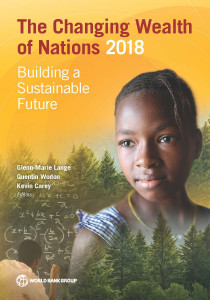
Fight the Empire's Per Fagereng welcomes Patrick Bond, professor of political economy at the University of the Witwatersrand Wits School of Governance. His research interests include political economy, environment, social policy, and geopolitics.
Bond writes in The Changing Wealth of Nations in Pambazuka News:
New evidence of Africa’s systematic looting, provided by an increasingly schizophrenic World Bank
A recent World Bank report, The Changing Wealth of Nations 2018, offers evidence of how much poorer Africa is becoming thanks to rampant minerals, oil and gas extraction. Yet World Bank policies and practices remain oriented to enforcing foreign loan repayments and transnational corporate profit repatriation, thus maintaining the looting.
A brand new World Bank report, The Changing Wealth of Nations 2018, offers evidence of how much poorer Africa is becoming thanks to rampant minerals, oil and gas extraction. Yet Bank policies and practices remain oriented to enforcing foreign loan repayments and transnational corporate (TNC) profit repatriation, thus maintaining the looting.
Central to its “natural capital accounting,” the Bank uses an “Adjusted Net Savings” (ANS) measure for changes in economic, ecological and educational wealth. This is surely preferable to “Gross National Income” (GNI, a minor variant of Gross Domestic Product), which fails to consider depletion of non-renewable natural resources and pollution (not to mention unpaid women’s and community work).
In its latest world survey (with 1990-2015 data), the Bank concludes that sub-Saharan Africa loses roughly $100 billion of ANS annually because it is “the only region with periods of negative levels – averaging negative three percent of GNI over the past decade – suggesting that its development policies are not yet sufficiently promoting sustainable economic growth… Clearly, natural resource depletion is one of the key drivers of negative ANS in the region.”
The Bank asks, “How does sub-Saharan Africa compare to other regions? Not favourably.” Contrary to pernicious “Africa Rising” mythology, the ANS decline for sub-Saharan Africa was worst from 2001-09 and 2013-15.
Other regions of the world scored strongly positive ANS increases, in the 5-25 percent range. Richer, resource-intensive countries such as Australia, Canada and Norway have positive ANS resource outcomes partly because their TNCs return profits to home-based shareholders.
- KBOO



